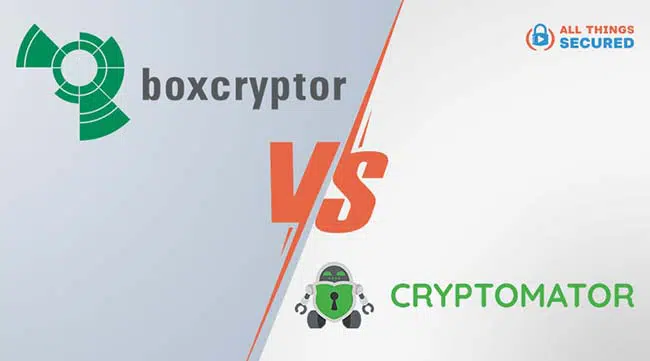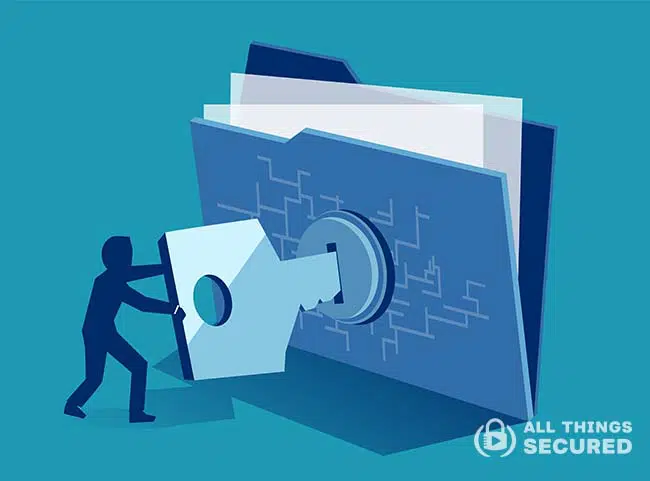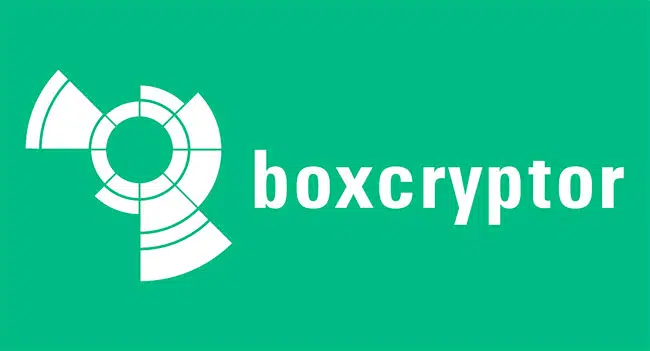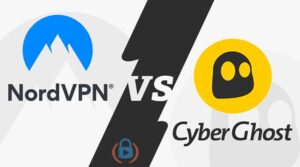When you compare Cryptomator vs Boxcryptor, both of which are good client-side encryption programs, it’s more than just “free” vs “paid”. In this comparison review, you’ll see the pros and cons of each approach and understand what does matter when making your decision.

Encrypting your data helps protect it from cyber attacks and eliminates most of the risk of keeping your data on “the cloud”, so it’s important to choose a quality encryption tool.
Cryptomator and Boxcrypter are two popular tools for data encryption, but they are quite different.
Today, we’ll examine the features, benefits, and functions of Cryptomator and Boxcrypter.
Note: Some of the links in this article may be affiliate links, which means that at no extra cost to you, I may be compensated if you choose to use one of the services listed. I only recommend what I personally have used, and I appreciate your support!
Why Encrypt Files Stored in the Cloud?
Cloud storage is when data is stored on servers online rather than on a device. It’s an increasingly popular way to store and share files, but it carries with it a number of different risks. There are numerous encrypted cloud storage options, but if you use one of the free or popular options, there are quite a few risks due to the fact that they aren’t end-to-end encrypted.
For example, there’s the risk that:
- ...the cloud storage provider could get hacked. It’s not likely, but when you store the data with a third party, you’re trusting that the they have strong protections against any kind of outside attacks.
- …an employee could try to access your files. Again, there are usually protections in place to prevent this, but it’s not out of the realm of possibility.
- …the files could be stolen in transit. Maybe the cloud provider is secure, but your data gets jacked while being moved from your device to the cloud storage server.
The primary benefit of cloud storage encryption, also known as “client-side encryption“, is that only authorized individuals with decryption keys can read the encrypted data. Even for the cloud storage companies (Google, Dropbox, Microsoft, etc.) can’t read the data you store on their servers.

The data is useless if hackers do end up stealing it, which eliminates most of the risks mentioned above.
Two of the most popular companies that offer this kind of client-side encryption are Boxcryptor and Cryptomator. Before we do a direct comparison of Cryptomator vs Boxcryptor, let’s look at each individually.
Cryptomator – DIY, Free & Open Source

Cryptomator is disk encryption software that benefits from being an open-source, donation-supported service.
They have apps for Windows, Mac, Android, iOS and Linux.
Pros and Cons of Cryptomator
There are many reasons why Cryptomator is such a popular service.
First, as mentioned earlier, it is open source and is therefore easy to modify as well as easy to access from many devices, including smartphones. Not to mention they are free to use and even come with excellent online documentation.
The software does have cons, but not many to worry about.
The lack of file sharing and customer support options means that it is not the best options for business organizations. Then again, some may see this as a benefit for anyone who needs to protect their private data with an extra layer of security.
Boxcryptor – Managed, Supported and NOT Free
Boxcryptor behaves similarly to Cryptomator, but it has more features and is even easier to use. Of course, this all comes at a cost to you as the consumer, albeit a small one.
Pros and Cons of Boxcryptor
The Boxcryptor technology has several other advantages as well. It supports file sharing and company use. If you still need extra secure encryption, you can use this software to protect your data with two-factor authentication.
Two factor authentication ensures that anyone trying to access the data with the password would also need a randomized 6-digit code sent directly to the email or phone number on file before they can log in.
Boxcryptor may sound objectively better than Cryptomator, but it still has some drawbacks.
One of these disadvantages is that Boxcryptor is not free unless you don’t care about specific features such as filename encryption, email support, unlimited device access.
If you want to subscribe to the version “for individuals,” then you can pay either $48 a year ($108 for three years) for personal use or $96 a year ($216 for three years) for business use.
Cryptomator vs Boxcryptor Compared
Putting the pros and cons of both encryption softwares aside, when you cmpare Cryptomator vs Boxcryptor, they have the same basic features, but the execution of these features is quite different.
| CryptoMator | Boxcryptor | |
|---|---|---|
| Business Model | Free | Subscription |
| Supported Platforms | Limited, manual setup | All major cloud providers |
| File Sharing: | Not a native feature | Possible |
| 2FA Support | No | Yes |
| Open Source Code | Yes | No |
| Available Apps | Yes | Yes |
| Pricing: | Free to Download | Free to Try (limited) |
Supported Platforms
Cryptomator is very limited in its device and storage compatibility. Anyone using this software can still access it with popular cloud platforms such as Google Drive, Dropbox, and OneDrive, but they can only use some web storages based on these applications.
The device and storage compatibility for Boxcryptor is much larger. It can already work with the aforementioned popular cloud platforms while still supporting other options including Egnyte, Amazon S3, and SpiderOak One. The software can also function on any storage system that android and iOS devices provide.
Encryption Process
When it comes to Cryptomator, encrypted data goes to storage vaults before it goes directly to the software. If you want to use this storage, Cryptomator will take note of a certain pathway and use it to check files. A change in a single file will also lead to changes in the entire storage vault, so keep that in mind when editing content in Cryptomator.
Files encrypted with a Boxcryptor are subsequently stored in key vaults. That way, these files are encrypted one after the other so if a single file changes in any way, then users can easily change the content without ruining other files.
File Sharing
Despite not having any official file sharing capabilities, other users can access files encrypted with Cryptomator–if the Cryptomator user gives them the password. This approach is problematic if the password is lost or ends up in the wrong hands.
Boxcryptor is more accessible to other users since they can use account credentials to access files from the software. The system will email a link of the files to external users, which also gives them a prompt to install Boxcryptor.
Security Measures
Unfortunately, Cryptomator does not include two-factor authentication, which makes password sharing even riskier for users. If cyber criminals manage to steal a Cryptomator user’s password, then nothing is stopping them from stealing files that don’t belong to them.
Boxcryptor does include two-factor authentication, but users don’t need it every time they log onto the software. Additionally, this authentication works with any authenticator applications that offer a mathematically uncrackable one-time pad (OTP) Vernam-cipher.
Code Viewing
For anyone who cares about the coding of their encrypted files, Cryptomator users can easily see these codes since they are written in Java language. This feature makes the software more user-friendly and even allows people to learn the encryption so that they can replicate it themselves.
Novice coders may be disappointed to learn that they cannot see the code of files encrypted in Boxcryptor because they are stored in key vaults. You can still see the code from inside these vaults but only if you pay for the service. This difference is potentially another reason why the full Boxcryptor experience is not free.
Account Creation
Creating an account for Cryptomator is not required for users who want to access the software on a web browser. While you can access Cryptomator from your smartphone, many more people may access it from a web browser, hence why the service is free and doesn’t require an account to use in this situation.
Conversely, signing up for Boxcryptor is essential since files are shared through emails, which accounts are necessary for. If users who are paying for Boxcryptor need decryption keys, then they can find them in the same central server that other users can retrieve them from.
Cryptomator vs Boxcryptor? Which Should You Use?
When it comes to Cryptomator vs Boxcryptor, which encryption software is best for you?
The answer really depends on you. If you’re the kind of person who prefers saving money and doesn’t mind getting your hands dirty with manual setup processes, then Cryptomator is for you.
However, if you need a more plug-and-play solution that doesn’t require confusing setup and offers customer support, then Boxcryptor is a great solution.
Download Boxcryptor
Try it for free here:
Thankfully, even the paid subscription isn’t very expensive.
In the end, whichever you choose, it’s important that you take control of your data by encrypting what gets stored in the cloud. That doesn’t matter if you’re a small business or an individual. Encrypt your own data!


